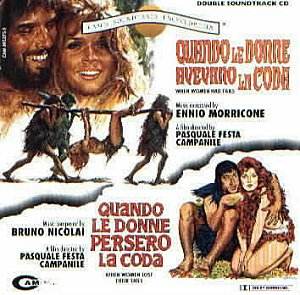Ennio MORRICONE
Quando Le Donne Avevano La Coda (When Women Had
Tails)
Bruno NICOLAI
Quando Le Donne Persero La Coda (When Women Lost Their Tails)
 Double Soundtrack
CD CAM 495375 -2 [45:21]
Double Soundtrack
CD CAM 495375 -2 [45:21]

The rating for this double soundtrack suggests these are average scores.
Please remember that the powers of suggestion are often false.
Ennio Morricone's comedic "Quando Le Donne Avevano La Coda" makes absolutely
no sense and is positively dazzling about it. One hears the trademark audacity
of the composer in an insane surplus. The music seems to have no idea of
exactly where it wishes to be, but sounds very determined to exhibit wherever
it is. I therefore challenge anyone to explain to me the musico-dramatico
significance of combining primitive vocals merged with 1970s technique, a
jocund main theme that pops up anywhere (anytime, anything), all sorts of
oddball orchestrations, a playful violin, a cancan, and something that sounds
strangely like a variation on 'Twinkle, Twinkle, Little Star.' That's for
starters.
But Morricone severely overextends his musical slapstick, further draining
his score of understanding, and defying listeners' senses. The novelty and
the lunatic genius behind it must be heard to be believed, hopefully even
admired, but once the novelty wears thin all we are left with is the shadow
of a composer who wrote better scores before and has since. Despite
the amusing permutations, that essential, sought-after timelessness of filmusic
is far removed.
Bruno Nicolai's sequel score, "Quando Le Donne Persero La Coda," is slightly
more coherent, and brings some closure to the earlier score's residual dementia.
This also means it is considerably less interesting. Morricone has had problems
following in his own footsteps, so no surprise when Nicolai fails to recapture
the innovation of the original, much less match Morricone's métier.
What it has is period weirdness.
There is a saying that goes, "If it is in the music, it is in the man." Were
this album a pure example of its creators, a set of designer straitjackets
would be in order. Perhaps something mauve.
Reviewer
Jeffrey Wheeler

Ian Lace adds:-
Here is evidence of another facet of Morricone's versatility. Here he writes
with tongue firmly in cheek. Considering the farcical story line, he comes
up with an appropriately whimsical score with the sort of material you would
expect; music suggestive of the primitive and clumsy gait of the stone age
man complete with grunts and groans and softer more sighing tones of the
females bent on ensnaring their unwary mates and propagating the species.
Morricone uses the form of the bossa nova that was fashionable when the movie
was made back in 1970 -- with a mix of waltzes. His orchestrations are witty
and imaginative including the use of didgeridoo, wooden blocks and tubas
as well as low woodwinds to suggest the cavortings of the ape men. Music
suggestive of the slapstick silent film comedies is also used to good effect
and innocent romance is conveyed by a mix of harpsichord, pipes and triangle.
A charming if rather repetitive score. The short suite of Nicolai music is
really an extension of the Morricone score with very little added.
Reviewer
Ian Lace

![]()
![]()
![]()
![]()
![]()
![]()
![]()
![]()
![]()
![]()
![]()
![]()
![]()
![]()
![]()
![]()